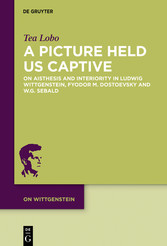Suchen und Finden
Service

A Picture Held Us Captive - On Aisthesis and Interiority in Ludwig Wittgenstein, Fyodor M. Dostoevsky and W.G. Sebald
Tea Lobo
Verlag Walter de Gruyter GmbH & Co.KG, 2019
ISBN 9783110610567 , 302 Seiten
Format ePUB
Kopierschutz Wasserzeichen
Geräte
Mehr zum Inhalt

A Picture Held Us Captive - On Aisthesis and Interiority in Ludwig Wittgenstein, Fyodor M. Dostoevsky and W.G. Sebald
While there are publications on Wittgenstein's interest in Dostoevsky's novels and the recurring mentions of Wittgenstein in Sebald's works, there has been no systematic scholarship on the relation between perception (such as showing and pictures) and the problem of an adequate presentation of interiority (such as intentions or pain) for these three thinkers.This relation is important in Wittgenstein's treatment of the subject and in his private language argument, but it is also an often overlooked motif in both Dostoevsky's and Sebald's works. Dostoevsky's depiction of mindset discrepancies in a rapidly modernizing Russia can be analyzed interms of multi-aspectivity. The theatricality of his characters demonstrates especially well Wittgenstein's account of interiority's interrelatedness with overt public practices and codes. In Sebald's Austerlitz, Wittgenstein's notion of family resemblances is an aesthetic strategy within the novel. Visual tropes are most obviously present in Sebald's use of photography, and can partially be read as an ethical-aesthetic imperative of rendering pain visible. Tea Lobo's book contributes towards a non-Cartesian account of literary presentations of inner life based on Wittgenstein's thought.
Tea Lobo, University of Fribourg, Switzerland.
Shop

